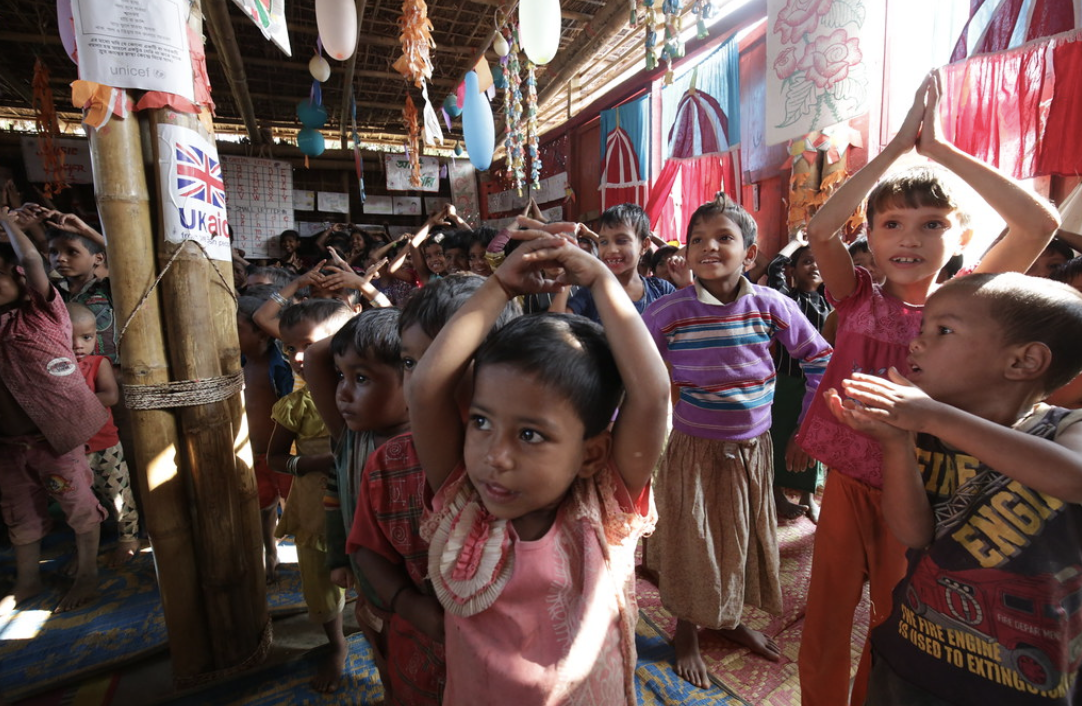The Rohingya are a Muslim ethnic minority who have lived in Myanmar for many generations. Despite that, they are not recognized as an official ethnic group and have been denied citizenship, making them the world’s largest stateless population. Following serious human rights violations and violent military crackdowns in Myanmar’s Rakhine State in August 2017, over 750,000 Rohingya fled to Bangladesh and joined the previous waves of Rohingya refugees who fled the country in the 1970s and 1990s. Today, nearly one million Rohingya refugees live in Bangladesh. A majority of them live in the Cox’s Bazar region, which is home to Kutupalong, the world’s largest refugee camp (UNHCR, 2023).
More than half of all Rohingya refugees in Bangladesh are children, with 400,000 school-aged children residing in Cox’s Bazar. Most of the children have never participated in formal schooling and previously had limited opportunities to learn or engage in the camps (May, 2023). Since the initial plight, the government of Bangladesh took a stance that Rohingyas could not be formally educated using the Bangladeshi curriculum. They feared that they would integrate in the country and not return to Myanmar in the future if they were educated (Khan, 2023).
In December 2021, authorities in Bangladesh banned schools that Rohingya teachers had established and closed madrases that provided Islamic religious education. Furthermore, they prohibited humanitarian groups from providing education to the children beyond basic, informal, primary-level classes. This policy left older students that are more advanced with no access to education. Children that are deprived of education are at an increased risk of child labor, child marriage, and poverty. Additionally, refugee children with an education are less likely to fall under the influence of criminals or armed groups, and are more likely to meaningfully contribute to their host countries (Human Rights Watch, 2019).
Rohingya children at a UNICEF informal school in the Kutupalong refugee camp, Cox’s Bazaar, Bangladesh, January 2018 (Watkins).
The Sishu Bikash Kendra early childhood center in Cox’s Bazar is funded by Education Cannot Wait (ECW), which is the United Nations’ global fund that supports children to access an education in emergency settings. They implement a “learning through play” strategy that allows students to develop critical social and emotional skills, self-advocacy, and emotional awareness to help them cope with trauma and not only learn, but also heal and flourish. Refugee children are especially vulnerable, so implementing early childhood interventions helps decrease cognitive, behavioral, and emotional difficulties as they grow older. For young Rohingya children, education is a critical first step toward normalcy and seeing themselves as a part of the world around them (May, 2023).
The 2023-24 academic year is the first time that Rohingya refugee children of all ages are studying under the Myanmar curriculum in Bangladesh (UNICEF, 2023). On July 23, 2023, the first day of school in the camps, UNICEF appealed to its partners and donors for $33 million to better support their education. The curriculum was first launched in 2021 for early grades, but was gradually expanded to grades 3 to 5. This year, the curriculum was introduced up to grade 10, which significantly increases opportunities for older children as well (The Business Standard, 2023).
A school for Rohingya refugee children in Bangladesh (Barnaby).
Allowing Rohingya refugee children to learn using the Myanmar curriculum is incredibly significant. Not only does it provide them with a sense of stability, but it also helps prepare them to reintegrate back into Myanmar when they are able to return in a safe manner. Save the Children applauded this major decision by the Bangladeshi government as it demonstrates their commitment to ensuring that all children have access to a quality education and a better future as access to education is a right for every child (Save the Children, 2023).
Works Cited
“Bangladesh: Rohingya Children Denied Education.” Human Rights Watch, 2 Dec. 2019, https://www.hrw.org/news/2019/12/02/bangladesh-rohingya-children-denied-education
Barnaby, Sir. “Supporting a school for Rohingya refugee children in Bangladesh.” Openverse, 9 June 2020, https://openverse.org/image/baa5a2d9-68c9-4334-816c-8510a1fbebd1?q=Rohingya%20children%20school
Khan, Shahriar Y. “The Elusive Right to Education for the Rohingya People.” Oxford Human Rights Hub, 16 Jan. 2023, https://ohrh.law.ox.ac.uk/the-elusive-right-to-education-for-the-rohingya-people/
May, Camille. “For These Rohingya Refugee Children, Play Is the Key to Education and Hope.” Global Citizen, 19 June 2023, https://www.globalcitizen.org/en/content/rohingya-refugee-children-education-impact/
Rayburn, Athena. “Expanded Education for Rohingya Refugee Children.” Save the Children, https://www.savethechildren.org/us/charity-stories/education-for-rohingya-refugee-children
“Rohingya Refugee Crisis Explained.” UNHCR, 23 Aug. 2023, https://www.unrefugees.org/news/rohingya-refugee-crisis-explained/
“3,00,000 Rohingya children begin new school year in refugee camps: Unicef.” The Business Standard, 23 July 2023, https://www.tbsnews.net/rohingya-crisis/300000-rohingya-children-begin-new-school-year-refugee-camps-unicef-670114
“UNICEF: Against the odds, children begin the new school year in Rohingya refugee camps.” UNICEF, 23 July 2023, https://www.unicef.org/press-releases/unicef-against-odds-children-begin-new-school-year-rohingya-refugee-camps
Watkins, Russell. “Rohingya children at a UNICEF informal school in the Kutupalong refugee camp, Cox’s Bazaar, Bangladesh, January 2018.” Openverse, 21 Jan. 2018, https://openverse.org/image/85589ec9-f426-4d52-807e-d3aab660f80b?q=Rohingya%20children%20school


